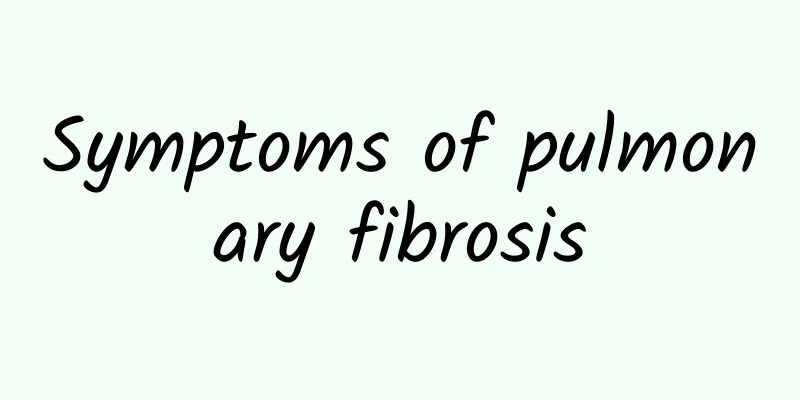Symptoms of pulmonary fibrosis

|
Many patients did not pay enough attention to lung disease in the early stages, which led to the transformation of lung disease into pulmonary fibrosis, seriously affecting lung health. Pulmonary fibrosis is a lung disease with a relatively high incidence rate among patients. Another troubling feature of this disease is that it is extremely difficult to cure. Therefore, patients who are afraid of suffering from pulmonary fibrosis should understand the early symptoms of pulmonary fibrosis. Early symptoms of pulmonary fibrosis Pulmonary fibrosis is a common and difficult-to-treat disease that seriously affects human health and life safety. Knowing your symptoms will help you find the right treatment. Early-stage pulmonary fibrosis will be beneficial to recovery if treated as soon as possible. Therefore, this disease must be taken seriously and you must receive systematic examinations and professional treatment as soon as possible. Generally, pulmonary fibrosis may be caused by the usual lung inflammation that is not treated in time, leading to later lung calcification and then pulmonary fibrosis. Common early symptoms include the following: 1. Coughing and expectoration. In addition to cough, there may also be dry cough or a small amount of mucus sputum, which may be mucopurulent or purulent, occasionally accompanied by bloody sputum. 2. Difficulty breathing. It often occurs during strenuous exercise and worsens over time. Breathing is shallow and rapid with nasal flaring, and accessory muscles are involved in breathing, but most people do not sit up to breathe. 3. Systemic symptoms. Early-stage pulmonary fibrosis may cause symptoms such as weight loss, fatigue, loss of appetite, and joint pain. When combined with infection, fever may recur, a few people may have joint pain, and chest pain is rare. Late stage symptoms of pulmonary fibrosis Most patients with pulmonary fibrosis are middle-aged and elderly. Low immunity, lack of exercise, and bad living habits are all causes of the disease. Because this disease is difficult to treat, you must take it seriously and receive treatment as soon as possible for the sake of your health and your family. The main symptom of late-stage pulmonary fibrosis is coughing, which is usually difficult and difficult to cough up with phlegm. Patients usually cough at night, and the cough becomes more severe, seriously affecting sleep quality and work and rest health, making patients physically and mentally exhausted. Patients should be careful not to overwork, otherwise it will increase the frequency of coughing and make the cough worse. Usually, late-stage symptoms include secondary colds, fever, cyanosis of the hands, shortness of breath, emaciation and weight loss. In the late stage of pulmonary fibrosis, the condition is serious and can cause changes in the normal lung tissue structure, and eventually the lung tissue will lose its function. This will lead to obstruction of gas flow exchange in the body, and the oxygen supply to the human blood will be insufficient, causing the patient's breathing to be obstructed, acidosis, and finally loss of labor. The patient can only survive by relying on a ventilator, and in severe cases, he or she will eventually fail and die. |
<<: Can liver fibrosis be detected by B-ultrasound?
>>: Fibrosis of left upper lobe
Recommend
Shave this part of your body regularly to keep away diseases all year round!
Nowadays, many people in society choose scraping....
What to do if you are allergic to ointment and itching
I don’t know if you have noticed in life that man...
Exercise heart rate, heart rate formula needs to be understood
Exercise heart rate is our heart rate when we exe...
The efficacy and function of red and white peony root
Red peony root is a Chinese herbal medicine, a ty...
The harm of dental caries
Dental caries is mainly a common pathological les...
Immunohistochemistry of gastric stromal tumors
It is well known that gastric stromal tumor immun...
Can I drink realgar wine?
We know that in ancient times realgar was used as...
Is walking backwards good for lumbar disc herniation?
Walking backwards has certain benefits for lumbar...
How to quickly eliminate blood stasis in the head
Because the brain is hit and bruised, it will cau...
Are there any side effects if you do too much nebulization?
When it comes to atomization, I believe most peop...
Will false labor cause abdominal pain?
As the fetus continues to grow in the mother'...
What are the symptoms of abnormal liver function?
The liver is the most important detoxification or...
Is liver palm disease serious?
A healthy lifestyle will keep people in good phys...
Take a picture of it every day, lose weight, detoxify and eliminate all gynecological diseases
It is our ancient Chinese medicine method - tappi...
What is air conditioning disease?
Nowadays, white-collar workers in big cities basi...









